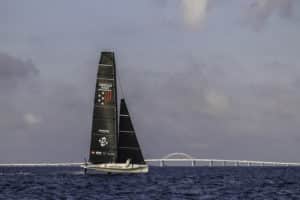IHMC researchers collaborating with American Magic team
Published 7.14.23
New York Yacht Club American Magic’s move to Pensacola has resulted in a collaboration with the Florida Institute for Human and Machine Cognition (IHMC).

The New York Yacht Club American Magic. Credit: American Magic team.
Since 2018, the professional sailing team has used the Port of Pensacola for seasonal training. In 2023, they decided to make Pensacola their permanent home. This strategic move is expected to generate 170 jobs in advanced manufacturing, engineering, design, and high-tech research and development.
The collaboration originated when Pensacola Mayor D.C. Reeves included IHMC on a city tour with the racing team.
“Soon after this introduction, members of the IHMC team toured the American Magic facilities, and the brainstorming began,” said Ryan Tilley, IHMC’s director of strategic program execution and innovation.
Leading the collaboration for IHMC has been Research Scientist Dr. Matt Johnson. Johnson said that on the tour, the team highlighted a number of technical challenges they were working on, including improving the interface used by the crew.
“They are constantly developing and testing new ideas,” Jonson said. “Considering IHMC’s experience designing interfaces for advanced technology, it was a natural fit for collaboration between the two organizations.”
Johnson’s research areas include human-machine teaming, human-machine system design, human-centered computing, human-machine interface design, and multi-robot control.
The goal of any new interface design is to improve the team’s overall performance. Johnson says the interface design challenge is complicated. “Not only is the yacht itself complex, but it is also part of a greater system that involves eight crew members, each with their specific roles.”
American Magic can be described as an “airplane on water… operated in a harsh, unforgiving environment where success hinges on narrow margins.” Johnson says. “The interface plays a crucial role in seamlessly integrating the crew with the yacht, ensuring that each crew member has access to the essential information required to fulfill their respective roles.”
During a race, the demands on the team are extraordinary, so improving their ability to interpret system status quickly and intuitively is the goal.
Johnson says IHMC has completed an initial analysis and the human-centered assessment approach has already proven helpful to the American Magic team.
Working with IHMC on this project has benefited the team tremendously, said Anderson Reggio, Performance Manager of NYYC American Magic.
“It has allowed our engineers to integrate ideas and suggestions from skilled subject matter experts that we do not typically encounter in the yachting world,” Reggio said. “It has been a phenomenal start to our relationship, and we hope that it will provide us with a competitive edge when we begin racing in Barcelona.”
Tilley expressed optimism that this collaboration is the beginning of a long and fruitful partnership: “We look forward to a long-term relationship providing solutions for the American Magic team and hope to play a small role in their future victories.”
IHMC is a not-for-profit research institute of the Florida University System where researchers pioneer science and technology aimed at leveraging and extending human capabilities. IHMC researchers and staff collaborate extensively with the government, industry and academia to help develop breakthrough technologies. IHMC research partners have included: DARPA, the National Science Foundation, NASA, Army, Navy, Air Force, National Institutes of Health, IBM, Microsoft, Honda, Boeing, Lockheed, and many others.
Latest News
- STEM-Talk: Ask Me Anything with Dr. Ken Ford
- David Bear joins IHMC Board of Directors
- STEM-Talk: Michael Schmidt on building a space-faring civilization
- Florida Blue award supports health and wellness research and outreach at IHMC
- STEM-Talk: Ken Forbus on AI and his development of the Structure Mapping Engine
- STEM-Talk: Pascal Lee on returning to the Moon — and heading to Mars
- Aging Symposium draws experts to IHMC
- IHMC hosts Fredric G. Levin Lung Care Symposium March 27-28 in Pensacola
- Humanoid robotics and exoskeletons lead latest IHMC newsletter

